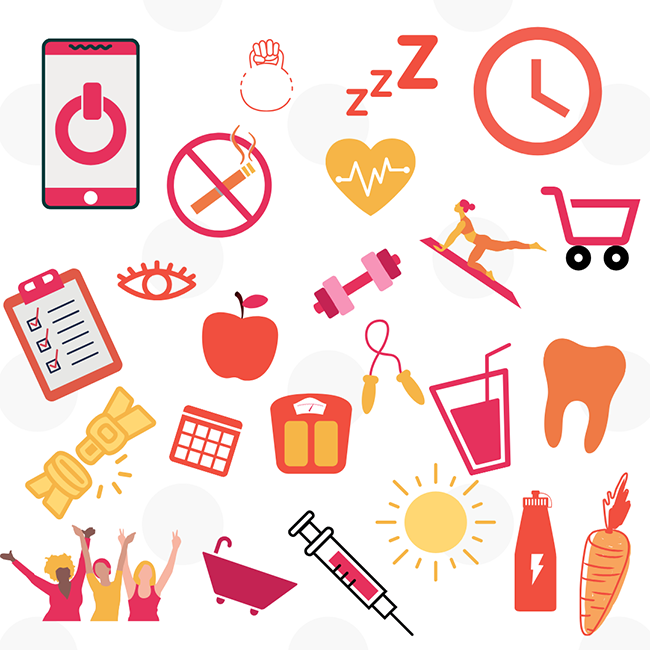
It’s a new year, and a great opportunity to set and accomplish new goals. Managing your health doesn’t have to be complicated or time-consuming, and small changes can make a big difference in your life. There are several healthy habits you can integrate into your day-to-day routine to help you improve your overall health and quality of life. Here are 20 health improvements for 2020:
- Stop smoking. Research supported by the National Institutes of Health https://www.fda.gov/(NIH), the Centers for Disease Control and Prevention (CDC), and the U.S. Food and Drug Administration (FDA) confirms that even if you’re 60 or older and have been smoking for decades, quitting will improve your health.
- Wear your seatbelts - seatbelt use is the most effective way to save lives and reduce severe injuries. According to National Highway Traffic Safety Administration (NHTSA), car crashes are the leading cause of death for people age 4 and every age 11 through 27 in the U.S. With 45 to 60 percent effectiveness, seat belts are the single most effective means of reducing the risk of death in a crash and have saved nearly 300,000 lives since 1975 in the U.S. alone.
- Cutback on sugary beverages. The Center for Disease Control and Prevention advises us to "Rethink Your Drink," by limiting the sweet drinks we consume and offering alternatives.
- Move! (be physically active) The National Heart, Lung, and Blood Institute (NHLBI) teaches us that your exercise can be done all at one time, or intermittently throughout the day. Activities to get you started could include walking or swimming at a slow pace. You can start out by walking 30 minutes for 3 days a week and build to 45 minutes of more intense walking, at least 5 days a week.
- Deal with any drug problems. Drugs don’t have to be illegal to be addictive and cause problems in your life.
- Practice safe sex, taking steps before and during sex that can prevent you from getting an infection, or from giving an infection to your partner.
- Schedule your colonoscopy. According to the National Institute of Diabetes and Digestive and Kidney Diseases (NIDDK), early screening means early detection of polyps and cancer.
- Lessen your alcohol intake. Drinking too much – on a single occasion or over time – can take a serious toll on your health, according to the National Institute on Alcohol Abuse and Alcoholism (NIAAA).
- Seek counseling for depression. Substance Abuse and Mental Health Services Administration’s (SAMHSA) National Helpline, 1-800-662-HELP (4357), (also known as the Treatment Referral Routing Service) or TTY: 1-800-487-4889 is a confidential, free, 24-hour-a-day, 365-day-a-year, information service, in English and Spanish, for individuals and family members facing mental and/or substance use disorders. This service provides referrals to local treatment facilities, support groups, and community-based organizations. Callers can also order free publications and other information.
- Get your moles checked. Seek a doctor to look at suspicious moles or skin concerns especially if they have changed in size or color.
- Take a break. Rest and refresh to improve your day-to-day productivity.
- Cutback your sugar intake. Sugar, while sweet to the taste can wreak havoc on our health. Replacing sugary snacks with whole grains and natural fruit can improve your diet and fitness.
- See your eye doctor. Take care of your eye health. The National Eye Institute (NEI) has tips on finding an eye doctor.
- Lessen your screen time. The Mayo Clinic reports that lessening your screen time can benefit improved physical health, decrease obesity, increase time to try new activities, improved mood, and enhanced relationships.
- Take slow deep breathes. Learning deep breathing techniques can help with relaxation, curb the fight or flight response, increase oxygen intake, slow heart rate and lower blood pressure.
- Volunteer to help someone. Helping others can help with your own physical activity, depression, stress level, and confidence, according to AARP.
- Spend time around good supportive friends. Strong social connections can assist with your overall well-being. Staying connected and maintaining a circle of friends means that you have emotional stimulation, laughter, and encouragement.
- Keep your dental appointment. Don’t wait until you are in pain. Your dentist can do an oral health screening addressing potential and ongoing issues. Check out the National Institute on Aging’s tips for taking care of your teeth and mouth.
- Get your pap smear. This can help prevent cervical cancer or find it early.
- Drink more water. It’s important for your body to have plenty of fluids each day. Water helps you digest your food, absorb nutrients from food, and then get rid of the unused waste.
Do you have a story idea for us? Do you want to submit a guest blog? If it's about equity, diversity, or inclusion, please submit to edi.stories@nih.gov.
For news, updates, and videos, follow or subscribe to EDI on: Twitter, Instagram, Blog, YouTube.






